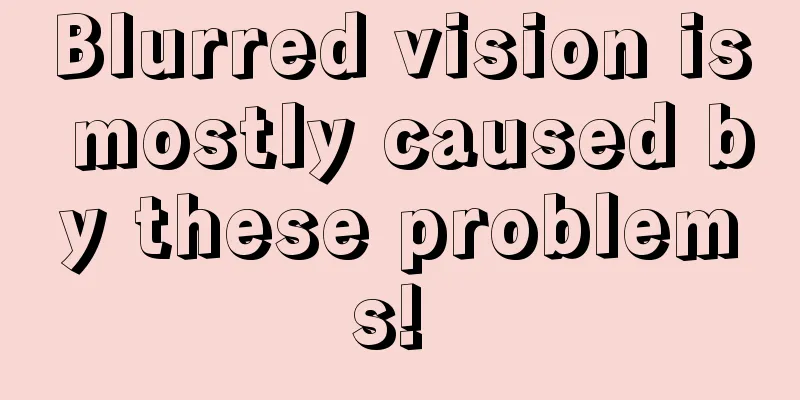Blurred vision is mostly caused by these problems!

|
Eye vision has always been a concern for modern young people. From children to the elderly, everyone is paying attention to the health of their eyes. Many people often have blurred vision when looking at things. The main reasons include retinal damage, bacteria and dust entering the eyes, eye diseases and inflammation, which can lead to refractive errors and blurred vision. These occur at different ages and indicate different causes and diseases. Causes The lesions that cause blurred vision are located in a wide range of areas, so the causes of blurred vision are also varied. 1. Inflammation is the most common cause of blurred vision. (1) Infectious: keratitis, corneal ulcer, iridocyclitis, choroiditis, endophthalmitis, panophthalmitis, orbital cellulitis, etc. caused by bacteria, viruses, chlamydia, fungi, parasites, etc. (2) Non-infectious: bullous stromal keratitis, uveitis (including iridocyclitis and choroiditis), sympathetic ophthalmia, Harada disease, etc. 2. Refractive error Myopia, hyperopia, astigmatism, presbyopia. 3. Strabismus and amblyopia. 4. Eye injury Eye perforation, blunt trauma, explosion injury, chemical burns, radiation injury, etc. 5. Glaucoma. 6. Sequelae caused by various eye diseases Corneal scar, pupil occlusion, pupil closure, vitreous opacities. 7. Systemic circulatory disorders, metabolic disorders and genetic diseases Hypertensive retinopathy, diabetic retinopathy, nephritic retinopathy, pregnancy-induced hypertension retinopathy, hematologic retinopathy, retinitis pigmentosa, macular degeneration, ischemic optic neuropathy, Leber's disease and other fundus lesions, cataracts. 8. Retinal vascular disease and retinal detachment Retinal artery occlusion, retinal vein occlusion, central cardiac serous chorioretinopathy, retinal vasculitis, retinal detachment, etc. 9. Senile and degenerative diseases Senile cataracts, corneal degeneration, age-related macular degeneration. 10. Tumors Intraocular tumors, orbital tumors, or eyelid tumors that invade the eyeball, etc. 11. Eye fatigue Unhygienic use of eyes or eye malnutrition, etc. 12. Others Visual pathway lesions. Recovery Methods 1. Gaze into the distance: Find a meadow or green tree 10 meters away: Since green light has a shorter wavelength, it forms an image in front of the retina, which relaxes the eye's accommodation and ciliary muscles, reducing eye fatigue. Don't squint or blink too often. Clear your mind, concentrate, and stare intently for 25 seconds to identify the outline of grass or leaves. Then place your left palm slightly higher than your eyes and about 30 cm in front of your eyes, and look at the palm lines one by one from beginning to end, for about 5 seconds. After looking at the palm lines, stare at the grass or leaves in the distance for 25 seconds, and then look at the palm lines again. Repeat 20 times in 10 minutes, three times a day. If your eyesight is severely impaired, you should increase the number of training sessions. 2. Crystal Gymnastics ● Eye rotation: Hold your chin with both hands and rotate your eyeballs 10 times in the order of up, down, left and right, then rotate counterclockwise and clockwise 10 times each. ● Find a scene 3 meters away (such as: calligraphy and painting on the wall, etc.), and at the same time raise your left hand and stretch it slightly above your eyes (about 30 cm). After seeing the lines on your palm clearly, look at the distant object clearly, and move your eyes between the two as quickly as possible, back and forth 20 times. 3. Massage You can sit or lie on your back, close your eyes naturally, and then massage the acupoints around the eyes one by one. The acupoints must be located accurately and the technique must be gentle, until a local soreness and swelling sensation is felt. 1. Rub Tianying acupoint: Use the thumbs of both hands to gently rub Tianying acupoint (below the eyebrows, at the upper outer corner of the eye socket). 2. Press the Jingming acupoint: Use the thumb of one hand to gently press the Jingming acupoint (the root of the nose close to the inner canthus of the eyes), press down first, then press upwards 3. Rub the Sibai point: Use your index finger to rub the Sibai point in the center of the cheek (one horizontal finger directly below the lower edge of the eye socket). 4. Press the temple and scrape the eye sockets: Press the temple with your thumb (one horizontal finger back from the middle of the eyebrow and the outer corner of the eye), and then use the inner side of the second section of the bent index finger to lightly scrape the eye socket in a circle, from upper inside -> upper outside -> lower outside -> lower inside, so that the acupoints around the eye socket such as Zanzhuyuyao, Sizhukong, Tongziliao, Qiuhou, Chengqi, etc. can be massaged. It is beneficial for pseudomyopia or preventing the worsening of myopia. |
<<: How to treat pharyngitis? These little remedies are the most reliable
>>: What is the best thing to eat when you have excessive sweating?
Recommend
Can sweat steaming detoxify the face?
In recent years, more and more women have begun t...
How to kill scabies and remove them from the skin?
Scabies is a parasite that grows on human skin. T...
How to train clavicle muscles
The clavicle is close to the shoulder joint and c...
What is varicose veins
In recent years, various diseases among the elder...
What is the most effective way to treat nasal mucosal erosion
When it comes to the treatment of nasal mucosal e...
What should I do if there are lymph nodes on the liver?
The liver is a very important organ for everyone....
What are the key points of nursing and health care for advanced liver cancer? Introduction to key points of daily nursing for advanced liver cancer
I believe that people are familiar with liver can...
What are the causes of kidney cancer
Kidney cancer has become the most common cancer a...
Early diagnosis of bladder cancer
Diseases like bladder cancer, if they can be diag...
How to measure blood pressure more accurately
Blood pressure is an important health indicator o...
What department does localized scleroderma belong to?
Speaking of scleroderma, many friends feel that i...
What are the specialties of northern Shaanxi?
I believe many people have traveled to northern S...
What should I do if I cough every time I catch a cold
Cold is a very common disease for many people. Mo...
Scars from cigarette burns
If you accidentally get burned by cigarettes on y...
Can I take a shower if I have chickenpox scars?
When you suffer from chickenpox, don't panic,...









